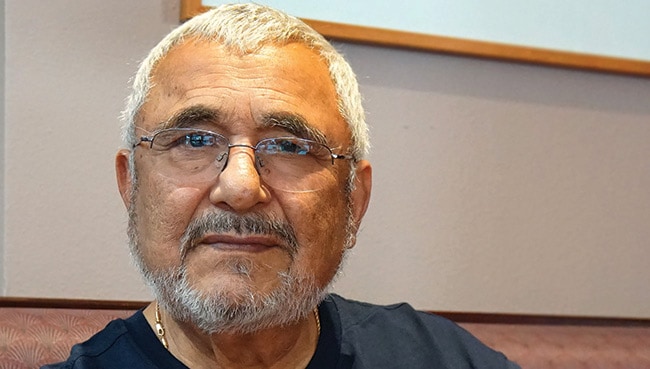Nangy Ghafarshad talks about his Afghan homeland-podcast in his own words

By Andrew Alonzo | aalonzo@claremont-courier.com
When Nangy Ghafarshad and his wife Fahima were watching the news late one night and saw pictures of the Afghanistan people under siege by the Taliban, all they could do was weep.
Having resided there previously, Mr. Ghafarshad described his homeland as one of the most beautiful and comfortable places to live, saying it was “peaceful but extremely primitive.” Primitive in the sense that things were done decades behind, he explained.
Known in Claremont since 1973 as the owner of Walter’s Restaurant, Mr. Ghafarshad shared his thoughts on Wednesday about the current state of Afghanistan now that the Taliban has taken over. By no means is Mr. Ghafarshad an official spokesperson for the country; however, as a self-described Afghani American and an American advisor on Afghanistan between 2009 and 2010, he’s well aware of the issues that have historically and currently plague the country, including the Taliban.
Comparing Afghanistan during the time the Taliban first took over [from 1996 to 2001] versus the years of progress since, Mr. Ghafarshad said the difference is like night and day.
“First of all…the media has progressed in that country like you can’t believe. If you watch an Afghan broadcast, you would think you were watching an American one,” he said. “From the point of education, the Afghan girls and boys and adults go to school 100 times more than the time of the Taliban. The freedom for women is enormous… All of these things are progress.”
However, on August 6, all that progress seems to have come to a screeching halt. That Friday, the Taliban walked back on a deal they made with President Joe Biden when U.S. troops left the area and officially seized control of the Afghanistan province of Nimroz. On August 15—not even 10 days later—contrary to projections that Kabul could outlast the Taliban fighters for 90 days, the capital city fell into Taliban hands. Despite the Afghanistan military being well equipped with weapons and training to repel the Taliban, Mr. Ghafarshad explained that the country’s soldiers did not have the morale or conviction to fight their enemy.
“They [soldiers] never thought they were fighting for themselves, they thought they were fighting for the salary we gave them. And that’s such a shame,” he said. “[if] Somebody gives them more money, they’ll go on that side…They’re extremely vicious fighters and patriots, but they have to believe in the fight.”
Mr. Ghafarshad was unable to explain why the Afghanistan military gave up the fight so quickly after losing Kabul.
“It is such a mystery to me that how in the world an army of 300,000 people, who are trained, and they’re all going to surrender to Taliban. And the intelligence service of Afghanistan and the CIA, did not have any intelligence about it?” He added, “It doesn’t make me believe that they just went [left], there was some type of agreement…something. Because starting with the president and his whole clique, [then] the whole army surrendered and they escaped with money. It doesn’t make sense to me.”
Mr. Ghafarshad also said that it did not help when other countries like the United States set a mandatory evacuation date for its citizens, sending floods of people out of the city and to the airport. “That gave the launch for the Taliban to say, ‘oh they’re leaving, so we’ll go in, there’s no one to fight us.’”
Asked if the new Taliban regime can be trusted given their [brutal] past, Mr. Ghafarshad said absolutely not, since they broke their promises to not attack Kabul or other cities with force.
“They are doing this to get an assurance from the West so they recognize them,” he said. “To me the real personality of the group doesn’t change. They will do some, very little changes.”
Explaining the origins of the Taliban, Mr. Ghafarshad said that Afghanistan used to train six- to seven-year-old child soldiers to fight against the former Soviet Union by sending them to religious schools. It was at these institutes where “all they learned was…the most fundamental system of Islam. Actually in my eyes, it’s not Islam.”
They grew up to learn how to kill and they all became the leaders today…They were brainwashed while they were there to conquer their country and that is the worst thing you can do to an Afghan,” he said.
Asked why Mullah Abdul Ghani Baradar was back in Afghanistan, Mr. Ghafarshad said that, “he’s saying that he wants to get all the other [Taliban] factions together and bring a balanced government.” He added “That has to be seen.” Baradar was described by Mr. Ghafardshad as “probably a little more moderate than the rest of” the other political members of the Taliban. Baradar is the co-founder of the Taliban and was released from a Pakistani prison in 2018 as a means for peace talks between the Trump administration and the Taliban to proceed.
With much of the country under siege and officials focused on evacuation efforts, Mr. Ghafarshad said donations to help right now may be a tricky thing since there’s no way to tell where the money’s going.
“The leaders are the ones who should distribute it but they just put it in their own pocket,” he said.
Even with harsh sanctions by other countries, he said the Taliban and Afghan citizens who do remain there will most likely adapt to their situation. Coupled with their resilience, Mr. Ghafarshad said, “those people have learned to live without things and it’s very difficult to put sanctions on them for things unless they’ve learned [a lesson].”









0 Comments